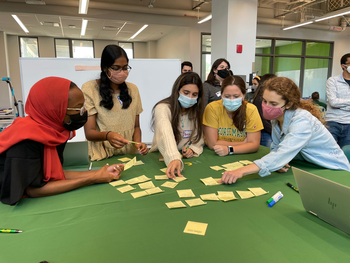
Two dozen Honors College students and four hours on a Saturday is a recipe for great new ideas, as demonstrated at Honors College Connects’ first-ever Nonprofit Hackathon. This event brought three local and one international nonprofit into a space with motivated student volunteers, who participated in a rapid-fire guided challenge in human-centered design – making and testing rapid prototypes with an eye towards creating user-friendly ideas. Over the course of the day, the students bonded with each other, networked with their nonprofit partner, addressed challenges with brilliant creativity, and had fun giving back to the community.
Honors College Connects (HCC) is a student-led program that connects students with local nonprofits, giving them the opportunity to gain valuable professional experience and develop leadership skills. According to HCC student leader Elizabeth Fortson, the main goal of the HNRS 261 Honors College Connects class is "to work with nonprofit partners to solve some kind of strategic question that the nonprofit has."
Some of these questions can take multiple weeks or months of brainpower and teamwork to tackle, but the Hackathon sought to tackle something different. Rather than taking a whole semester, the Hackathon gave one day to solving smaller topics.
In addition to creating a space to solve these smaller topics, the event reached students who are not able to participate in the semester-long HCC classroom experience. Brandon Roca, another student leader, noted that, “as a leadership team we saw a need for [these] students to get more involved and see what human centered design is all about.”
Drawing on the multidisciplinary strengths of the Honors College's learning community, HCC is able to take on projects that do not fit neatly in a single discipline or field. Fortson says of this that “many of these problems aren’t in the realm of something a government major or a biology major would focus on… so having all these different multidisciplinary students brings a lot of different perspectives in terms of what we should do, how we should do it, why it would work, why it wouldn’t work.”
The morning of the Hackathon, students had four hours to rapidly respond to the issues the four nonprofits faced. The nonprofits featured in Fall 2021 were FACETS, Dulles Area Transportation Association (DATA), the Starfish Foundation, and Veterans Moving Forward. FACETS serves individuals and families who are homeless, low-income, or at-risk in Fairfax County, especially in response to the COVID-19 pandemic; DATA finds solutions to transportation issues faced in the Dulles area and promotes sustainable transportation options; the Starfish Foundation provides means for at-risk Ecuadorian youth to achieve post-secondary education and strives to empower these students; and Veterans Moving Forward provides service dogs and canine therapy services to veterans with physical and/or mental health challenges at no cost to the veteran.
Roca remarked that the rapid-fire format of a Hackathon gave the nonprofit partners chances to benefit by the "multiple perspectives" that Honors College students bring to the table. At the event, students helped the nonprofits with a range of changes, including logo design, public relations, outreach to different demographics, and evaluation of innovative programs.
The impact of the Hackathon was significant. The nonprofits involved were able to take the student-designed ideas and apply them to their own operations. Fortson noted that her favorite part of the Hackathon was watching the lively energy of the event, which was characterized by students running around and solving problems, resulting in amazing, fully-developed ideas that came from that chaos in a very short period of time.
Roca says that the HCC class will spend the rest of the semester working on some bigger projects for these same nonprofits - the kind that are not solved in a day. Honors College Connects plans to offer a Hackathon each Fall semester moving forward, extending the reach of the program and encouraging students who are not in the Honors College Connects classes to make an impact.
